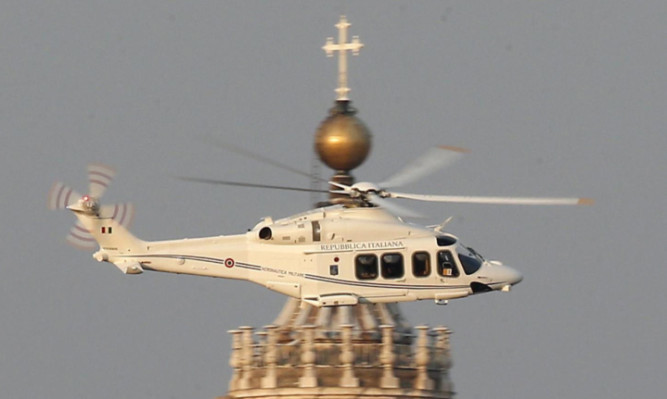Benedict XVI has become the first pope in 600 years to resign, ending an eight-year pontificate shaped by struggles to move the church past sex abuse scandals and to reawaken Christianity in an indifferent world.
The Swiss Guards standing at attention in Castel Gandolfo shut the gates of the palazzo shortly after 8pm local time, symbolically closing the doors on a papacy, the legacy of which will be marked by the way it ended in resignation rather than death.
In a final farewell to his cardinals as pope, Benedict tried to dispel concerns about the unprecedented future awaiting the Catholic Church, with one reigning and one retired pope living side-by-side.
Benedict flew by helicopter to the Vatican’s vacation retreat just hours before resigning.
Earlier in an unexpected address inside the Clementine Hall, the Pope appeared to be trying to defuse concerns about his future role and the possible conflicts arising from the peculiar situation of having both a reigning pope and a retired one.
Benedict also gave a final set of instructions to the “princes” of the church who will elect his successor, urging them to be united as they huddle to choose the 266th leader of the world’s 1.2 billion Catholics.
“May the College of Cardinals work like an orchestra, where diversity an expression of the universal church always works toward a higher and harmonious agreement,” he said.
It was seen as a clear reference to the deep internal divisions that have come to the fore in recent months following the leaks of sensitive Vatican documents that exposed power struggles and allegations of corruption inside the Vatican.
“Among you is also the future pope, whom I today promise my unconditional reverence and obedience,” Benedict told the cardinals.
His decision to live at the Vatican in retirement, be called “emeritus pope” and “Your Holiness” and wear the white cassock associated with the papacy has deepened concerns about the shadow he might cast.
But he has said that once retired he would be “hidden from the world” and living a life of prayer.
Vatican spokesman, the Rev Federico Lombardi, said the Pope’s pledge was in keeping with this effort to “explain how he intends to live this unprecedented situation of an emeritus pope.”
“He has no intention of interfering in the position or the decisions or the activity of his successor,” Lombardi said. “But as every member of the church, he says fully that he recognises the authority of the supreme pastor of the church who will be elected to succeed him.”
